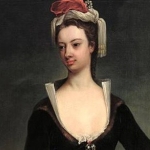ROXANA from the court retiring late,
Sigh'd her soft sorrows at St. JAMES's gate:
Such heavy thoughts lay brooding in her breast,
Not her own chairmen wth more weight opprest;
They groan the cruel load they're doom'd to bear ;
She in these gentler sounds express'd her care.
" Was it for this, that I these Roses wear,
" For this new-set my Jewels for my hair ?
" Ah ! Princess ! with what zeal have I pursu'd !
" Almost forgot the duty of a Prude.
" Thinking I never cou'd attend too soon,
" I've miss'd my prayers, to get me dress'd by noon.
" For Thee, ah ! what for Thee did I resign ?
" My Pleasures, Passions, all that e'er was mine.
" I sacrific'd both Modesty and Ease,
" Left Operas, and went to filthy Plays ;
" Double entendres shock'd my tender ear,
" Yet even this for Thee I chose to bear.
" In glowing youth, when nature bids be gay,
" By honour prompted, and by pride restrain'd,
" The pleasures of the young my soul disdain'd :
" Sermons I sought, and with a mien severe
" Censur'd my neighbours, and said daily pray'r.
" Alas ! how chang'd! — with the same sermon mien
" That once I pray'd, the What-d'ye call't I've seen.
" Ah ! cruel Princess, for thy sake I've lost
" That reputation which so dear had cost :
" I, who avoided ev'ry publick place,
" When bloom, and beauty bid me show my face ;
" Now near Thee constant ev'ry night abide
" With never-failing duty by thy side,
" Myself and daughters standing on a row,
" To all the foreigners a goodly show !
" Oft had your drawing-room been sadly thin,
" And merchants wives close by the chair had been seen ;
" Had not I amply fill'd the empty space,
" And sav'd your Highness from the dire disgrace.
" Yet COQUETILLA's artifice prevails,
" When all my merit and my duty fails :
" That COQUETILLA, whose deluding airs
" Corrupts our virgins, and our youth ensnares ;
" So sunk her character, so lost her fame,
" Scarce visited before your Highness came ;
" Yet for the Bed-chamber 'tis Her you chuse,
" When Zeal and Fame and Virtue you refuse.
" Ah ! worthy choice ! not one of all your train
" Whom censure blasts not, and dishonours stain.
" Let the nice hind now suckle dirty pigs,
" And the proud pea-hen snatch the cuckoo's eggs !
" Let IRIS leave her paint, and own her age,
" And grave SUFFOLKIA wed a giddy page !
" A greater miracle is daily view'd,
" A virtuous Princess with a court so lewd.
" I know thee, Court ! with all thy treach'rous wiles,
" Thy false caresses and undoing smiles !
" Ah ! Princess, learn'd in all the courtly arts
" To cheat our hopes, and yet to gain our hearts.
" Large lovely bribes are the great statesman's aim ;
" And the neglected patriot follows fame.
" The Prince is ogled ; some the King pursue ;
" But your ROXANA only follows YOU.
" Despis'd ROXANA, cease, and try to find
" Some other, since the Princess proves unkind :
" Perhaps it is not hard to find at court
" If not a greater, a more firm support.





















Comment form: